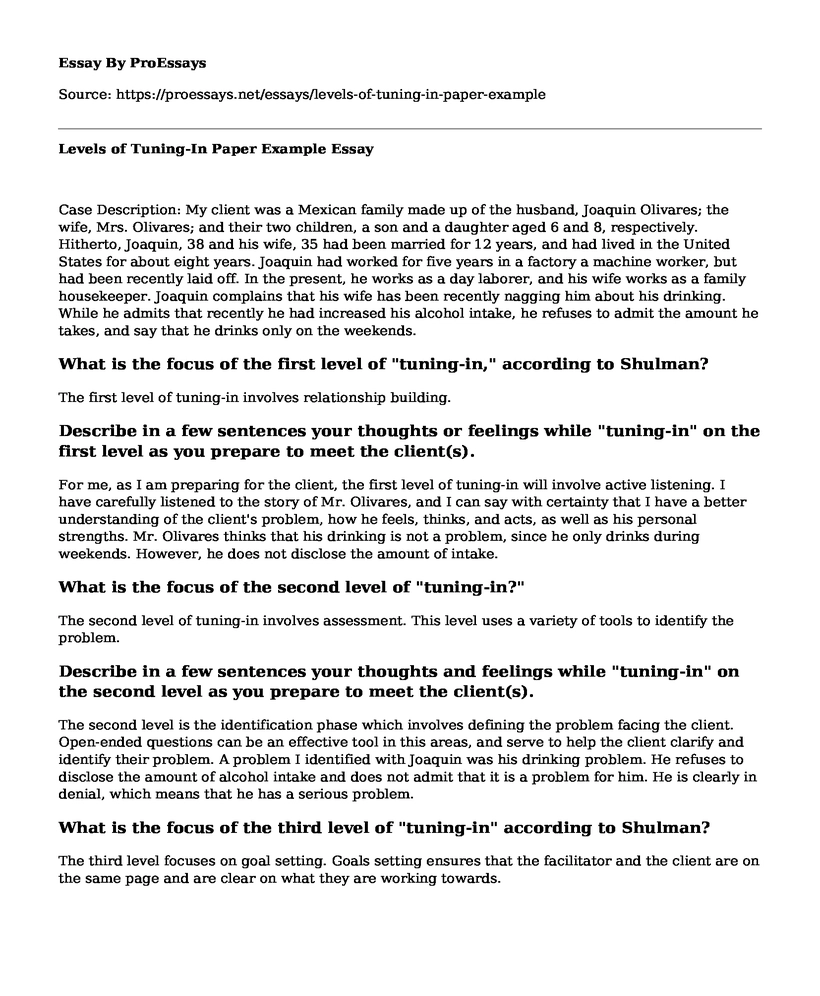Case Description: My client was a Mexican family made up of the husband, Joaquin Olivares; the wife, Mrs. Olivares; and their two children, a son and a daughter aged 6 and 8, respectively. Hitherto, Joaquin, 38 and his wife, 35 had been married for 12 years, and had lived in the United States for about eight years. Joaquin had worked for five years in a factory a machine worker, but had been recently laid off. In the present, he works as a day laborer, and his wife works as a family housekeeper. Joaquin complains that his wife has been recently nagging him about his drinking. While he admits that recently he had increased his alcohol intake, he refuses to admit the amount he takes, and say that he drinks only on the weekends.
What is the focus of the first level of "tuning-in," according to Shulman?
The first level of tuning-in involves relationship building.
Describe in a few sentences your thoughts or feelings while "tuning-in" on the first level as you prepare to meet the client(s).
For me, as I am preparing for the client, the first level of tuning-in will involve active listening. I have carefully listened to the story of Mr. Olivares, and I can say with certainty that I have a better understanding of the client's problem, how he feels, thinks, and acts, as well as his personal strengths. Mr. Olivares thinks that his drinking is not a problem, since he only drinks during weekends. However, he does not disclose the amount of intake.
What is the focus of the second level of "tuning-in?"
The second level of tuning-in involves assessment. This level uses a variety of tools to identify the problem.
Describe in a few sentences your thoughts and feelings while "tuning-in" on the second level as you prepare to meet the client(s).
The second level is the identification phase which involves defining the problem facing the client. Open-ended questions can be an effective tool in this areas, and serve to help the client clarify and identify their problem. A problem I identified with Joaquin was his drinking problem. He refuses to disclose the amount of alcohol intake and does not admit that it is a problem for him. He is clearly in denial, which means that he has a serious problem.
What is the focus of the third level of "tuning-in" according to Shulman?
The third level focuses on goal setting. Goals setting ensures that the facilitator and the client are on the same page and are clear on what they are working towards.
Describe in a few sentences your thoughts or feelings while tuning-in on the third level?
The goal setting phase can also be termed as the problem-solving level. Here, the facilitator is expected to help the client define their goals, develop ways for achieving the goals, examining the potential issues and outcomes of every strategy, and deciding on the plan of action. After a session with the Olivares Family, we decided on two key goals: helping the Olivares Family to better adapt to the American society since the family cited difficulties in speaking fluent English; and helping Joaquin Olivares reduce his alcohol intake.
What is the focus of the fourth level of "tuning-in" according to Shulman?
The fourth level of tuning-in focuses on interventions. Having the appropriate interventions reflects the theoretical orientation of the facilitator.
Describe in a few sentences your thoughts or feelings while tuning-in on the fourth level?
At this level, I feel like the facilitator should not only provide the client with interventions to address the issue, but also ensure continuous encouragement and support. Here, the facilitator should also recognize the strengths of the client, and leverage the strengths to tailor effective interventions. I recommended an expatriate program for the Olivares family to ensure that they have a better understanding of the way of life and the customs of the American society. In the case of Joaquin, I recommended various strategies to help him reduce his alcohol intake. They included setting a goal of the number of drinks he takes every weekend; counting and measuring his drinks; spacing the drinks (for instance, skipping drinking every other weekend); and avoiding what triggers his drinking. I plan to visit the Olivares family once every week to check on their progress and support them where necessary.
References
Shulman, L. (2012). Brooks/Cole empowerment series: The skills of helping individuals, families, groups, and communities. Cengage Learning.
Cite this page
Levels of Tuning-In Paper Example. (2022, Sep 15). Retrieved from https://proessays.net/essays/levels-of-tuning-in-paper-example
If you are the original author of this essay and no longer wish to have it published on the ProEssays website, please click below to request its removal:
- Female Suicide Bombers
- Paranoid Schizophrenia Treatment Goals
- Psychotic Disorder: Schizophrenia Essay
- Essay Example on Mental Wellness in New Motherhood: Pregnancy, Birth & Beyond
- Essay Sample on Love and Hatred: Significant Factors in an Individual's Life
- Rise in Stress for Saudi Students in US Universities: Research Paper
- Critical Thinking: Identifying the Most Significant Obstacle - Essay Sample







